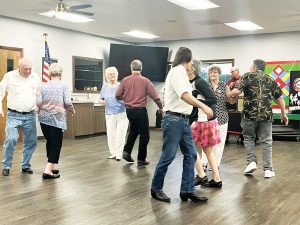Submitted by Sugar Creek Alzheimer’s Special Care Center
Staff Are Specially Trained
In a memory care residence, the staff-to-resident ratio is typically higher than in other types of senior living. On top of this, staff are specifically trained to understand the disease process and to meet the special needs of people with dementia. For instance, they must be able to recognize signs of pain, because they simply can’t rely on residents to speak up when something hurts. They must also be able to anticipate a resident’s needs, such as the need to drink or go to the bathroom, before they become urgent. As well, staff are also skilled in preventing situations that might trigger agitation or anxiety in someone.
Consistent Routines Create a Sense of Order
Memory care communities understand that adults living with dementia need a regular daily routine in order to thrive. “One of the most challenging deficits a person with memory loss faces is that they do not know what comes next,” says Sue Johnston, Sinceri Senior Living’s Vice President of Program Development. “The organizational order of life has been stripped away.” According to Johnston, Meaningful Moments®, Sinceri’s dementia care program, gives residents a sense of order by incorporating past routines into their new lives. In one case, points out Johnston, a staff member brings a resident her bible every night between 9:30 and 10pm so that the she can read scripture, something that has been part of her bedtime routine her entire life.
Life Stories and Past Routines Keep Residents Engaged
Should you visit a Sinceri memory care community you might see a small group of women stemming berries or snapping beans while a few of the men listen to a radio baseball game from years ago. Good memory care communities understand that it’s essential for people with dementia to take part in meaningful and enjoyable activities if they are to thrive. That’s why Sinceri schedules a wide range of activities, everything from music therapy to holiday celebrations to arts and crafts to exercise programs. Sinceri’s staff make it easy for residents to participate by giving them cues and breaking tasks down into small steps. As well, activities are offered in small groups because staff realize that people with dementia tend to be more anxious in large gatherings. Johnston also notes that Sinceri makes it a point to personalize activities. Staff find out each resident’s interests and accomplishments, likes and dislikes, and cherished memories so that the program director can create “meaningful moments” for residents.
Buildings Are Designed for Safety & Comfort
One other distinguishing characteristic of a memory care residence is the very design of the building itself. For starters, buildings are simple to navigate with wide hallways and secure exits and entrances that can only be opened with a numerical code, which keeps residents from wandering outside. Some memory care communities have a secured courtyard with walking areas, which gives residents independent access to the outdoors. As well, buildings may be designed to have small group seating arrangements so that the residents never feel as if they are residing with dozens of people.
Residents Are Encouraged to Eat More
Memory care communities also pay special attention to preparing and serving food as someone with dementia often has problems chewing or swallowing or handling utensils. To encourage residents to eat, communities may serve a lot of finger foods, which are easier for some residents to handle, or use ground ingredients, which make chewing and swallowing easier. One of the strategies Sinceri uses to improve nutrition is providing residents with three small meals plus three substantial snacks throughout the day.
Family Members Are Supported
An additional bonus that some memory care communities offer is a support program which allows family members the chance to connect with others who are going through similar challenges.
Sugar Creek Alzheimer’s Special Care Center is the leader in Memory Care Services in Central Illinois. They are located at 505 East Vernon Avenue, Normal, Illinois. They offer specialized care to those who are experiencing the challengers of Dementia and Alzheimer’s. For more information please contact Kristyn Durre, Area Community Resource Director, at 309-451-3000 for a tour.
For additional informative and inspirational articles, visit 50 Plus News and Views Bloomington/Normal online edition today.










